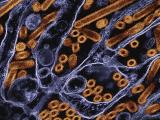Feb 17, 2005 (CIDRAP News) – The World Health Organization (WHO) is preparing to recommend that governments consider stockpiling vaccines against the H5N1 avian influenza virus now, rather than waiting until a human flu pandemic emerges, according to a story published online today by New Scientist magazine.
As noted in a WHO report released last month, the agency currently takes the position that it's not possible to stockpile a vaccine for a pandemic flu virus in advance, because the vaccine must closely match the pandemic strain. New Scientist said the policy shift will be detailed in a report to be released next month.
The magazine said the change reflects the fear that a pandemic is likely and that there will not be enough time to produce much vaccine once it starts. Flu vaccine is grown in chicken eggs, a process that takes months.
The view that an H5N1 vaccine couldn't be made until a pandemic started has been bolstered by research showing that H5N1 has evolved in recent years, extending its range of hosts and lingering longer in the environment.
However, some recent research suggests that a stockpiled vaccine could provide some protection even if it didn't precisely match the pandemic strain, the New Scientist report said. Experiments on animals exposed to the H5N1 virus suggest that a vaccine that is only a near match may reduce the severity of illness.
The article said people normally require two doses of vaccine to gain immunity to a new flu virus. An H5 vaccine would prime the immune system so that a person might need only one dose of a closely matched pandemic vaccine to gain immunity, the report said.
Clinical trials of H5 vaccine based on the strain circulating in Asia are about to start in the United States, with others planned for Canada, Australia, and Japan, New Scientist said. The United States has contracted for 4 million vaccine doses, while Italy and France anticipate stockpiling 2 million doses each.
Countries are trying to hedge their bets against a pandemic on the basis of relatively limited information. Canada is already planning to stockpile the antiviral drug oseltamivir, which has shown some effectiveness against the H5N1 virus. Now the country is considering buying up to 16 million doses of an older antiviral, amantidine, according to a report yesterday by the Canadian Press. Although amantidine isn't effective against the current strain of H5N1 in circulation, an official said a pandemic strain might be vulnerable to it.
"While the H5 that's currently in Southeast Asia appears to be resistant to amantadine, who knows what it is we will face?" Dr. David Butler-Jones, head of the Public Health Agency of Canada, was quoted as saying.
In related news, the United Nations Food and Agriculture Organization (FAO) yesterday urged the rest of the world to help fight avian flu in the affected Asian countries. "Major efforts are needed to curb it before other regions of the globe are affected by the virus," the FAO advised in a news release issued by the UN News Centre.
Countries with endemic avian flu must spend more money to control the disease by improving animal health and animal healthcare, the FAO and the World Animal Health Organization (OIE) said. They said donors are needed to help support national avian flu campaigns in poorer countries.
The two agencies have called a meeting in hard-hit Vietnam next week. Veterinarians, scientists, nongovernmental organizations, and donor representatives will meet in Ho Chi Minh City to address issues as varied as scientific advances, diagnosis, trade, international cooperation, and human health implications, the UN release said.
See also:
January 2005 WHO report on pandemic preparedness
http://www.wpro.who.int/entity/emerging_diseases/documents/docs/B115_44en.pdf
Feb 16 FAO statement
http://www.un.org/apps/news/story.asp?NewsID=13363&Cr=bird&Cr1=flu#
















